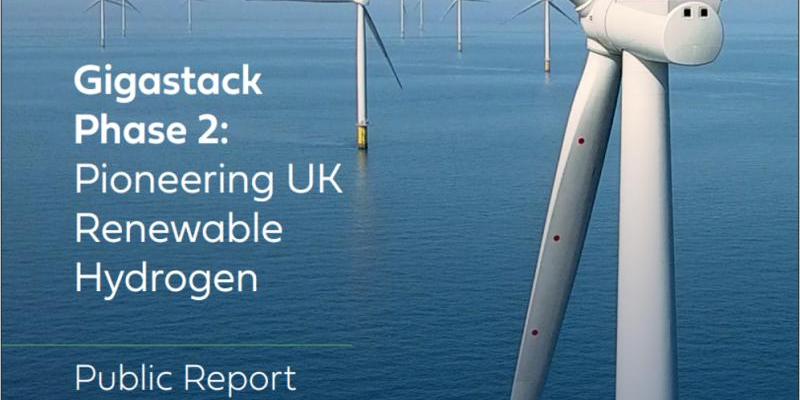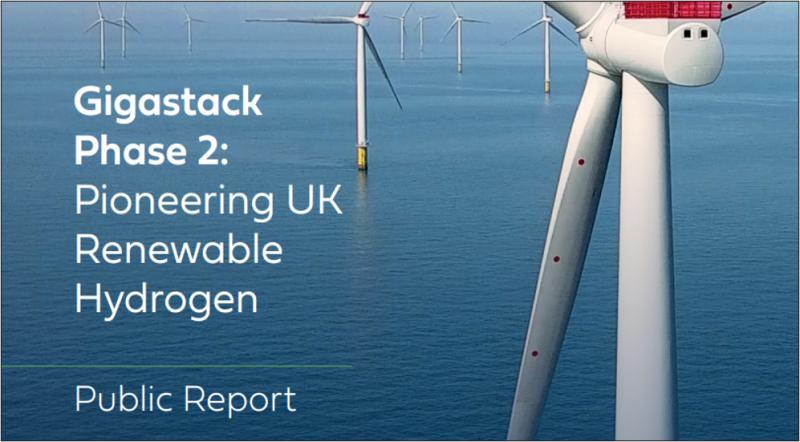Funded to date as part of the Department for Business, Energy and Industrial Strategy (BEIS) Hydrogen Supply Competition, Gigastack is an ambitious multi-phase programme aimed at proving renewable hydrogen at industrial scale and demonstrating the full decarbonisation potential of offshore wind in the UK’s largest industrial cluster – the Humber.
Gigastack Phase 2 has focused on accelerating the expansion of the UK’s renewable hydrogen sector by taking feasibility stage concepts through Front End Engineering Design for a 100MW electrolyser system, using renewable power from Hornsea Two – the world’s largest offshore windfarm – to provide renewable hydrogen to the Phillips 66 Humber Refinery to replace hydrocarbon-based fuels within industrial-scale fired heaters.
The two central tracks of work for Gigastack Phase 2 have seen:
- ITM Power progress its next generation of electrolyser technology and move into their new Gigafactory in Bessemer Park, Sheffield, now the world’s largest electrolyser production facility - representing a step-change in ambition and capacity, enabling a 40% reduction in costs for electrolyser stacks over the next three years.
- Ørsted and Phillips 66 develop the technical design for an industry-scale renewable hydrogen facility near Immingham, exploring the current policy and regulatory landscape, identifying barriers to developing large-scale renewable hydrogen production facilities, with potential solutions identified and building a business case to map a pathway to an investable proposition. The study suggests an opportunity to significantly reduce the Levelized Cost of Hydrogen (LCOH) by around 47% by 2030.
Once built, Gigastack will support the decarbonisation of the Humber region, the UK’s largest industrial cluster, and support the UK’s offshore wind and electrolyser supply chain competitiveness. Gigastack will also lay the groundwork for future expansion in the Humber region and will catalyse the renewable hydrogen sector by providing a blueprint for scalable electrolyser technology in the UK.
The project has already helped create more than 100 jobs at ITM Power’s Gigafactory and the initial 100MW is projected to create an additional 180 jobs, whilst an expansion to 1GW by 2030 could contribute up to £2.5bn Gross Value Added and 1,700 permanent jobs to Immingham’s local economy.
The Gigastack consortium’s main goal is to now reach a final investment decision in the next 18-months and work towards a commercial operating date in 2025, subject to a supportive policy environment. The consortium will seek to work with UK Government over the next twelve-months to secure revenue support, agree specific deployment targets for renewable hydrogen and ensure the Gigastack deployment target of 2025 is achieved.
Duncan Clark, Head of Region UK at Ørsted, said:
“The findings from the Gigastack project provide an important step for renewable hydrogen in the UK and highlight the decarbonisation opportunities achievable with the right support framework in place. Offshore wind provides enormous potential with the installed capacity we already have in the UK and with huge amounts more to come. There is a genuine opportunity to support the pathway to net-zero for energy-intensive industry through truly green hydrogen and for the UK to be at the global forefront of renewable hydrogen development and deployment.”
Philip Gothard, Gigastack Project Manager at Phillips 66, said:
“The launch of the Gigastack public report represents an important milestone for renewable hydrogen in the UK and demonstrates its key role within industrial decarbonisation. The work is testament to the close collaboration between consortium members and we are proud to have contributed with our skills and experience of operating large scale hydrogen production units for over 50 years. The Phillips 66 Humber Refinery is a UK leader in the production of lower carbon fuels and the only European producer of graphite coke for electric vehicle batteries. Gigastack is an exciting part of the Refinery’s decarbonisation journey and we look forward to progressing the project through to deployment.”
Dr Graham Cooley, CEO of ITM Power, commented:
“Gigastack is exactly the kind of project that will help to make the UK a world leader in technologies that can help the whole world address climate change issues. Backing green hydrogen now will deliver investment, skilled jobs and leadership in an energy transition sector that is set to grow exponentially over the coming decade. We need to be ready for that growth.”
Ben Madden, Partner at Element Energy, said:
“The consortium has demonstrated to the UK Government and the wider hydrogen sector the benefits of renewable hydrogen alongside a pathway to commercialisation and deployment of a GW-scale electrolyser facility by the end of 2025, subject to government support. The Gigastack project has the potential to catalyse the large-scale production and supply of renewable hydrogen in the UK, an important step in our wider decarbonisation journey to net zero.”


